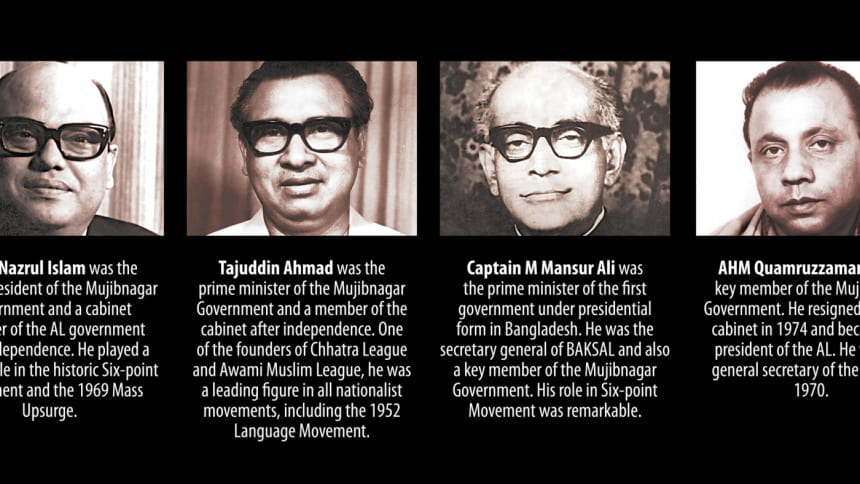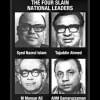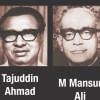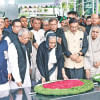Recalling our four national heroes

Wearing Khaki uniforms and carrying Sten guns and SLRs (self-loading rifles), five army personnel arrived at the erstwhile Dhaka central jail around 4:00am on November 3, 1975.
The five, including one who introduced himself as Captain Muslemuddin attached to the Bangabhaban, entered the jail and brutally killed four persons, says the FIR filed over the killing of the four national leaders -- Syed Nazrul Islam, Tajuddin Ahmad, AHM Quamruzzaman and M Mansur Ali.
The leaders had been put behind bars soon after the August 15, 1975, bloodbath that claimed the lives of Bangabandhu Sheikh Mujibur Rahman and most of his family members.
The four, who led the Liberation War in 1971 after Bangabandhu’s detention by the Pakistan army, were shot dead following repeated bayonet charges in the jail.
A day after the jail killing, Kazi Abdul Awal, the then deputy inspector general (prisons), filed the first information report (FIR) with Lalbagh Police Station.
ABM Fazlul Karim, the then OC of the police station, was tasked with the investigation and he visited the scene where a magistrate made an inquest report of the bodies. Later, a postmortem report was prepared and the OC collected evidence from the killing spot.
But the infamous Indemnity Ordinance blocked the investigation and the trial for about 21 years until officers of the Criminal Investigation Department (CID) reopened the probe on August 18, 1996.
In 2004, a trial court handed punishment to 11 perpetrators of the killings, but the sentence is yet to be executed.
The government could not even trace nine of the 11 despite making efforts through diplomatic channels, intelligence agencies and the Interpol to bring the fugitives back home.
Convicted killers Rashed Chowdhury and Noor Chowdhury are holed up somewhere in the USA and Canada. The government has failed to bring them back.
Against such a backdrop, the nation pays tribute to the four slain national leaders on the 44th anniversary of the Jail Killing today.
The government now insists that bringing all the 11 fugitives back home is one of its top priorities and all possible efforts are underway to this end.
On several occasions, Law Minister Anisul Huq said the government was planning to set up a commission to identify all those behind the killings of Bangabandhu and the four leaders.
He told The Daily Star yesterday that they had already taken legal steps and engaged with the US and the Canadian governments to bring back Rashed and Noor for executing the Supreme Court verdict against them.
Replying to a query, he reiterated the government’s promise that it would constitute a commission. He, however, did not say when it would be formed. “Discussions are taking place in this regard.”
Talking to The Daily Star, Attorney General Mahbubey Alam reiterated that the government was using its diplomatic and other channels to extradite the convicted killers and execute the verdicts against them.
Mahbubey Alam, also a member of the taskforce formed in 2010 to bring home the killers, said some of the attackers took part in both the murders of Bangabandhu and the four leaders, and four of them have been executed in the Bangabandhu murder case.
The Supreme Court in its judgment in the jail killing case observed that the assassination of the four national leaders was the result of a criminal conspiracy.
The accused couldn’t have carried out the killings unless very powerful state machineries were involved in the conspiracy, the then chief justice Surendra Kumar Sinha said in the verdict.
The apex court on April 30, 2013, upheld a Dhaka court’s verdict that awarded death sentence to three former army personnel and life imprisonment to eight other people for killing the four national leaders.
The three convicts handed capital punishment are Muslemuddin, Marfat Ali Shah and Abdul Hashem Mridha.
The eight jailed for life are Khondaker Abdur Rashid, Shariful Haq Dalim, Noor Chowdhury, Rashed Chowdhury, Ahmed Shariful Hossain, Abdul Majed, Kismat Hasem and Nazmul Hossain.
Four other accused -- Syed Farooq-ur Rahman, Sultan Shahriar Rashid Khan, Bazlul Huda and AKM Mohiuddin Ahmed -- were executed in the Bangabandhu murder case in 2010.
The following year, the SC exempted the four from the charges of killing the national leaders as they were executed.
Earlier in August 2008, the High Court had upheld the capital punishment to Muslemuddin and acquitted Marfat, Hashem, Farooq, Shahriar, Mohiuddin and Bazlul Huda in the jail killing case.
Barrister Abdullah Al Mamun, the state defence lawyer appointed by the SC for Marfat and Hashem, earlier told this correspondent that he didn’t know the whereabouts of the two convicted accused.
“Marfat Ali Shah, Abdul Hashem Mridha and their relatives have never communicated with me,” he added.
Meanwhile, President Abdul Hamid and Prime Minister Sheikh Hasina yesterday issued separate messages on the Jail Killing Day.

 For all latest news, follow The Daily Star's Google News channel.
For all latest news, follow The Daily Star's Google News channel. 








Comments